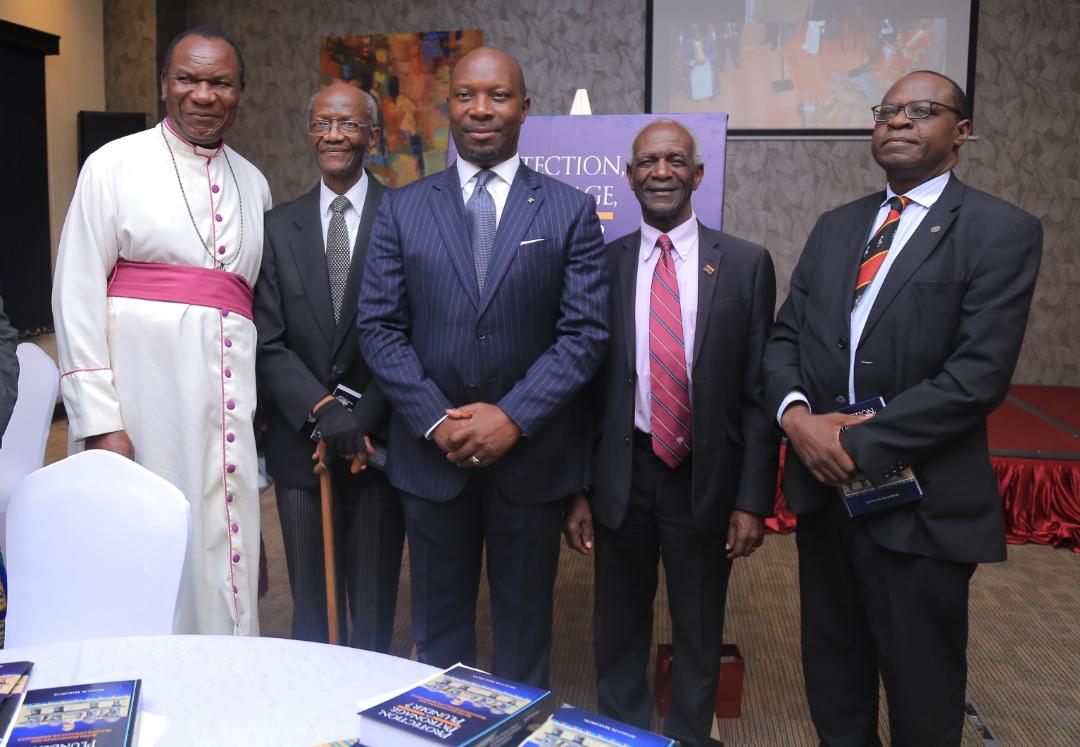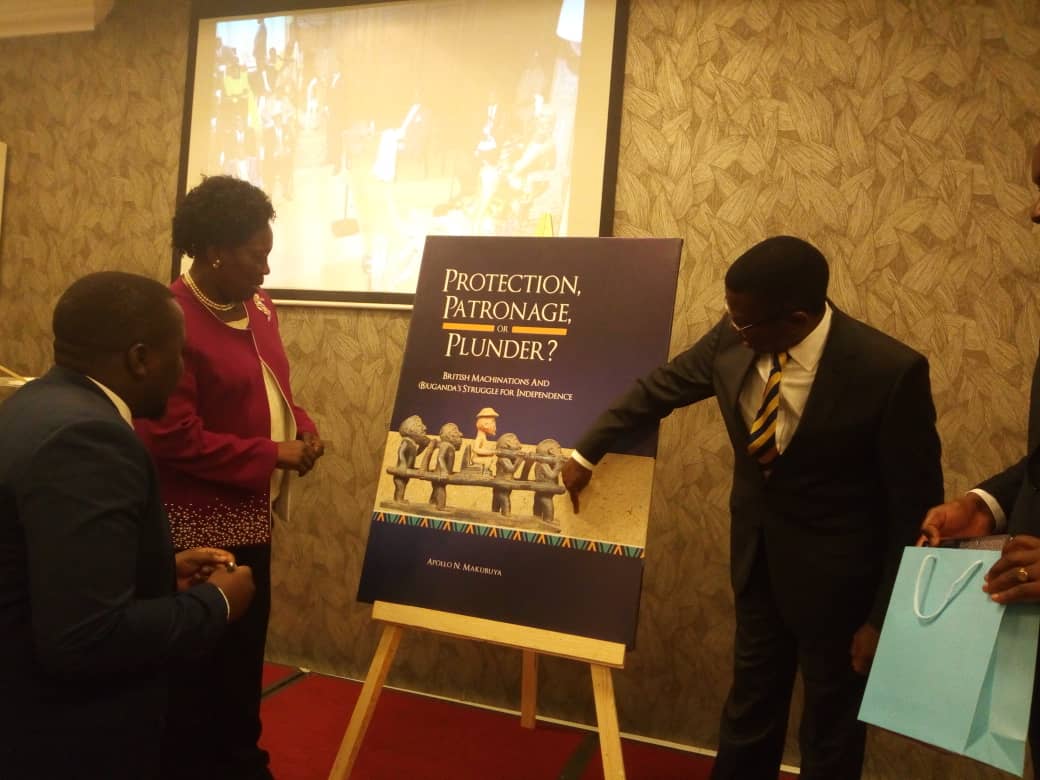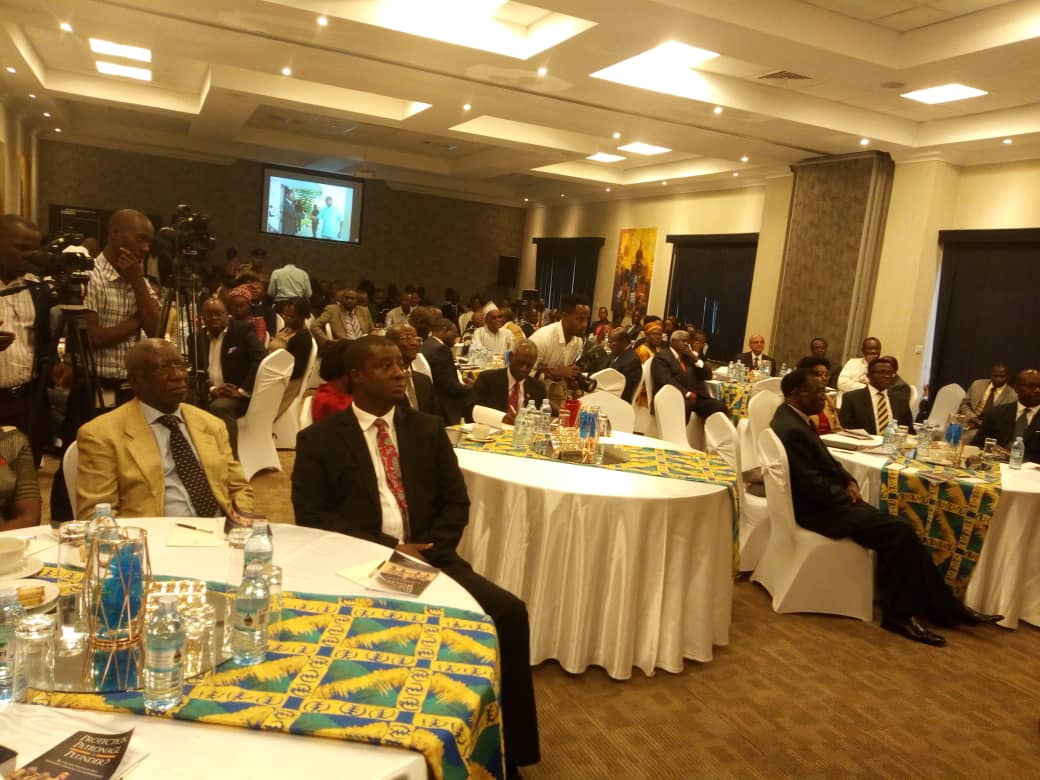
KAMPALA – In his new book titled Protection, Patronage or Plunder? Mr Apollo Makubuya, the Minister for Justice and Constitutional Affairs of the Kingdom of Buganda, revisits B-Uganda relations with British Colonial rule.
Mr. Makubuya says while Ugandans are still thinking about the British and other forms of colonialism, the country today is faced with even more dangerous predicaments caused by Chinese influence in Africa and Uganda.
“The new form of colonization comes in the name of China,” he said during a book launch at Mestil Hotel also graced by Speaker of Parliament Rebecca Kadaga and Buganda Kingdom Premiere Charles Peter Mayiga and others in Kampala on Monday morning.
“China is not just here in Uganda, it is in Zambia, in Angola, South Sudan, and Ethiopia etc, it is everywhere and what are the Chinese doing?” he wondered tasking the academia to question China, Uganda-Africa pact.

“How are we responding to these Chinese influences? Are we even aware? We might not be aware of the extent and nature of that new form of colonization.
Mr. Makubuya warned that China influence might return the irritating politics of divide and rule or race and that it might continue to affect the political stability of Uganda as it has done in many other African countries including Zimbabwe and Zambia.
His book also handles, the understanding the challenges of national integration, patriotism, and the so-called Buganda question.
Uganda’s growing relationship with China and other non-traditional allies has led to predictions that its long-awaited rise out of extreme poverty, disease, and destitution to become an economic giant is near.
Unlike the relationship with western countries such as Britain, Africa’s relationship with China is untainted by colonialism.
Uganda’s relationship with China dates back to 1962 when Uganda won independence from the British.
Like most new African states eager to fortify their independence, Uganda looked for alternative development partnerships.
China was one of the first countries to recognize Uganda’s independence and the two countries built a relationship based on non-interference with each other’s internal affairs.
The anti-gay law in Uganda and continued western criticism of President Yoweri Museveni’s 32-year-old rule only served to bind the two countries closer.
Museveni has repeatedly praised China’s string free grants for non-interference in the internal affairs of other countries.
During his swearing-in ceremony in May 2016, Museveni once again praised China; “…. these people are our genuine friends. They have no arrogance. If a man has his own house and he goes to another man’s house ……. What type of fool are you?”
Minister of State for Foreign Affairs, Okello Oryem has been at the forefront of promoting China’s interests in Uganda publicly stated thus:” This is China’s time. The USA and European countries had the opportunity to build Africa (but they did not succeed. Now the Chinese are building schools, dams, stadiums, hospitals, roads, etc. Gas, the song about democracy and human rights turned us into a developed country? If I want to give you a chicken or a goat do I first, ask you whether you beat your wife?”
In 2009 China overtook the US and Britain to become Africa’s leading trading partner. It is involved in virtually every sector of Uganda’s economy including sand mining and fishing.
When big donors such as Britain, the US, and the Netherlands slashed aid because of the anti-gay law, the government, in addition to levying new taxes, turned to China, making more investment deals with Beijing.
Given the human rights records of both China and Africa, civil society organizations have cautioned that this relationship is monitored lest it becomes one no different from colonialism, with China syphoning off resources, indifferent to Africa’s poverty.
Africans are now starting to question the nature of Chinese investment. In Kampala and upcountry, the Chinese presence is everywhere.

From owning shops and hawking merchandise to running hospitals and managing multi billion-dollar projects on which the entire future of Uganda rests, China’s presence is conspicuous. China National Oil Shore Corporation won the right to develop Uganda’s Kingfisher Field for $2bn. The Chinese have further invested in Uganda’s $2.5bn oil refinery and a $1.4bn rail construction project across East Africa.
The Chinese language has been introduced into the educational curriculum with over 20 schools selected including Makerere University to start teaching Chinese.
The government also announced plans recently to import Chinese teachers to train Ugandan teachers for the same project coupled with political cadres frequently undergoing ideological training in China.
China is also financing the construction of two dams and the also financed the recently launched Entebbe express highway.
Major government buildings, such as the Ministry of Foreign Affairs and the President’s Office, were constructed by the Chinese.
By 2011, China had invested $14bn in Africa and offered £75bn in aid. A big chunk of this money comes to Uganda and by 2013 bilateral trade between Uganda and China reached more than $500m.
It is from this background that Mr. Makubuya argues Ugandans especially the academia to rise up question Chinese influence in the country as it might come with ill-intentions.
Meanwhile, his book also he calls for Buganda’s position in country’s political affairs to be redefined.
He says the early administrators in the region encountered the progressive kingdom of Buganda, which they incorporated into the British Empire.
“Under the guise of protection, indirect rule, and patronage, Britain overran, plundered and disempowered the kingdom’s traditional institutions.
On liquidation of the Empire, Buganda was coaxed into a problematic political order largely dictated from London.
He says that 56 years after independence, the kingdom struggles to rediscover itself within Uganda’s fragile politics and now his book reconstructs a history of the machinations underpinning British imperial interests in B-Uganda and the personalities who embodied colonial rule.
It also addresses Anglo-Uganda relations, demonstrating how Uganda’s politics reflects its colonial past, and the forces shaping its future. It is a far-reaching examination of British rule in (B)-Uganda, questioning whether it was designed for protection, for patronage or for plunder.




